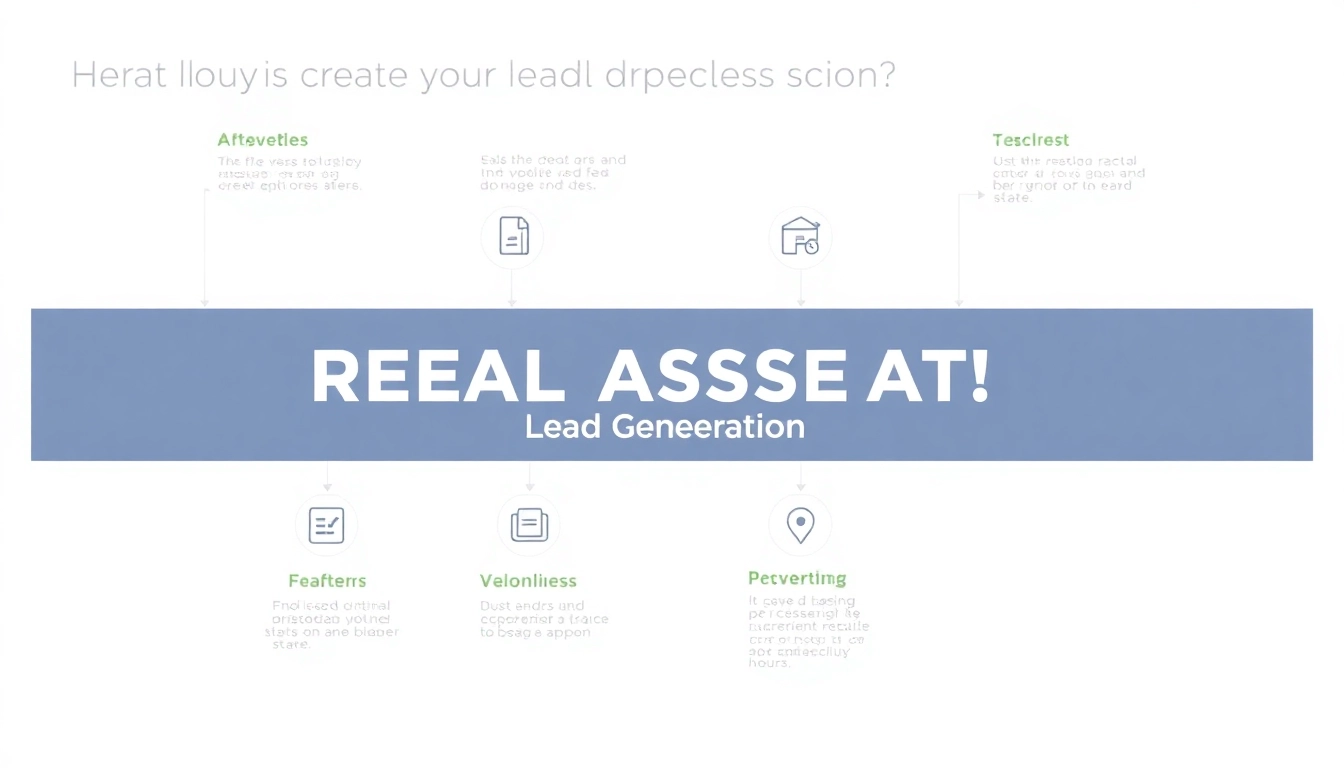Understanding Real Estate Virtual Assistant Lead Generation
In the fast-paced world of real estate, lead generation is the lifeblood of success. Agents are constantly seeking innovative ways to find and nurture potential buyers and sellers. One effective strategy that has gained traction is utilizing a real estate virtual assistant for lead generation. A real estate virtual assistant lead generation can streamline processes, enhance efficiency, and ultimately boost productivity. Understanding the role of virtual assistants in lead generation is critical for agents looking to maximize their time and resources.
What Is a Real Estate Virtual Assistant?
A real estate virtual assistant (VA) is a professional who provides administrative assistance to real estate agents remotely. They can perform a variety of tasks, from managing listings and market research to handling client communications and calendar management. This flexibility allows agents to focus on core activities, like closing deals, while delegating essential but time-consuming tasks to their VAs.
How Lead Generation Works in Real Estate
Lead generation is the process of attracting and converting prospects into potential clients. In real estate, this involves various strategies to capture interest, build relationships, and nurture leads until they are ready to make a purchase. Traditional methods include cold calling, door knocking, and hosting open houses, but today’s landscape is increasingly digital. Automation, data analytics, and online marketing strategies play significant roles in modern lead generation.
Benefits of Using Virtual Assistants for Lead Generation
Employing a virtual assistant for lead generation offers numerous advantages:
- Cost Efficiency: Hiring a VA can reduce overhead costs related to full-time employees.
- Focus on Core Activities: Delegating lead generation tasks allows agents to concentrate on sales, negotiations, and client relationships.
- Scalability: As business volume fluctuates, a VA can adapt to workload changes without the burden of long-term commitments.
- Access to Expertise: Many VAs specialize in real estate processes and can bring valuable insights and skills to the table.
Key Tasks for Real Estate Virtual Assistants
Essential Lead Generation Duties
Real estate VAs can handle a plethora of lead generation tasks, ensuring that agents maintain a healthy pipeline of potential clients:
- Database Management: Maintaining and updating client databases enables agents to effectively track leads.
- Social Media Management: Creating content and managing social platforms can attract and engage potential clients.
- Internet Research: Gathering information about market trends, competitors, and potential leads can provide agents with valuable insights.
- Cold Calling: Some VAs can handle initial outreach calls to potential leads, freeing up the agent’s time for more critical tasks.
Managing Lead Follow-Up Effectively
Lead follow-up is a critical component of lead generation in real estate. VAs can develop and manage systematic follow-up strategies, such as:
- Email Campaigns: Sending personalized follow-up emails can keep the communication line open.
- Scheduling Appointments: Coordination of meetings or calls ensures that no lead falls through the cracks.
- Tracking Responses: Monitoring engagement with leads and adjusting tactics based on their responses can enhance conversion rates.
Utilizing Technology and Tools for Efficiency
The integration of technology is fundamental to lead generation. Virtual assistants can leverage various tools to streamline processes:
- Customer Relationship Management (CRM) Systems: Tools like HubSpot or Salesforce help VAs organize and track leads.
- Social Media Tools: Platforms such as Hootsuite enable efficient management of multiple social media accounts.
- Marketing Automation Tools: Services like Mailchimp allow for automated email campaigns and tracking analytics.
- Real Estate Software: Programs like Zillow Premier Agent can help manage listings and connect with potential clients.
Effective Strategies for Lead Generation
Leveraging Social Media to Generate Leads
Social media has transformed how real estate professionals connect with clients. VAs can help agents tap into platforms like Facebook, Instagram, and LinkedIn through strategic content creation:
- Content Creation: Regularly posting informative articles, market updates, and engaging photos can attract followers.
- Paid Advertising: Utilizing targeted ads can significantly boost visibility among potential clients.
- Engagement: Responding to comments and messages timely enhances client relations and builds trust.
Building Email Campaigns with a Virtual Assistant
Email marketing remains one of the most effective ways to nurture leads. A VA can design and implement campaigns that resonate with potential clients:
- Segmenting Audiences: Tailoring emails based on the lead’s status can improve response rates.
- Design and Layout: Crafting visually appealing templates can increase engagement.
- Analytics Review: Monitoring open rates and conversions aids in fine-tuning future campaigns.
Optimizing Listings and Online Presence
Having an optimized online presence is crucial for generating leads. Real estate VAs can assist in enhancing listings and profiles:
- SEO Optimization: Employing best practices in search engine optimization ensures listings appear in relevant searches.
- Professional Photography: High-quality images can make listings stand out.
- Compelling Descriptions: Writing engaging, informative property descriptions can attract serious inquiries.
Measuring Success in Lead Generation
Key Performance Indicators for Virtual Assistants
To evaluate the effectiveness of using a virtual assistant for lead generation, it’s essential to monitor specific key performance indicators (KPIs):
- Lead Conversion Rate: The percentage of leads that move further in the sales funnel can indicate effectiveness.
- Response Time: Measuring how quickly the VA responds to leads can reflect on the business’s professionalism.
- Follow-Up Frequency: A high follow-up rate often correlates with increased conversions.
Monitoring and Adjusting Your Strategies
Real estate is a dynamic market, and strategies must be adaptable. Regularly reviewing metrics allows agents to pivot their approaches:
- Analytics Tools: Utilize tools such as Google Analytics to gather data on website traffic and conversion sources.
- A/B Testing: Experimenting with different approaches can uncover what resonates best with clients.
- Feedback Loop: Gathering feedback from clients can provide insights into how to improve lead generation efforts.
Evaluating ROI from Virtual Assistant Services
Calculating the return on investment from utilizing virtual assistants for lead generation is crucial for continued success. Factors to consider include:
- Cost of Services: Compare the costs associated with hiring a VA against the revenue generated from leads.
- Time Saved: Evaluate how much time is freed up for agents to focus on closing deals.
- Client Acquisition Costs: Analyzing how much is spent to acquire a client vs. their lifetime value can inform overall effectiveness.
Hiring the Right Virtual Assistant for Your Needs
What to Look for in a Real Estate Virtual Assistant
Selecting the right VA is pivotal for successful lead generation. Consider the following attributes:
- Experience in Real Estate: A familiarity with industry jargon and processes can facilitate smoother operations.
- Technical Skills: Proficiency with CRM systems and marketing tools is essential.
- Communication Skills: Strong verbal and written communication skills are critical for client interactions.
- Time Management: A VA should demonstrate the ability to prioritize tasks effectively.
Common Mistakes to Avoid When Hiring
Many agents make missteps during the hiring process. Avoiding these common mistakes can lead to better outcomes:
- Rushing the Process: Taking the time to vet candidates thoroughly can prevent mismatch issues later.
- Lack of Clarity: Define specific roles and responsibilities to set the VA up for success.
- Ignoring Cultural Fit: Personalities should align with company values to foster a productive working relationship.
Creating a Successful Working Relationship
After hiring, it’s vital to cultivate a strong working relationship with your VA. Strategies include:
- Regular Communication: Schedule weekly check-ins to align on goals and progress.
- Providing Feedback: Constructive feedback helps VAs improve and adjust their approaches.
- Setting Expectations: Clearly outline expected outcomes and help your VA understand industry dynamics to enhance their contributions.



